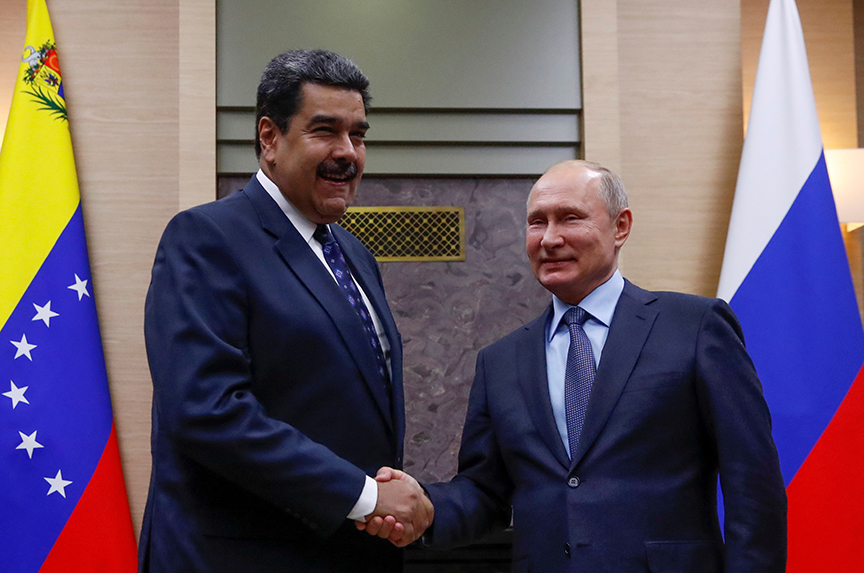With the arrival of its troops and military advisers in Caracas this past weekend, Russia has upped the ante with the United States over how to deal with the crisis in Venezuela.
While the United States — along with dozens of other countries — recognizes Juan Guaidó as the interim president of Venezuela, Russia has thrown its lot behind Nicolás Maduro.
And so it was that two Russian military aircraft carrying advisers and troops — as many as 100 troops according to some accounts — arrived in Caracas on March 23.
“Maduro’s survival gives Russia a foothold in the Americas,” explained Jason Marczak, director of the Atlantic Council’s Adrienne Arsht Latin America Center.
“And with Maduro’s policies wreaking chaos inside Venezuela and spurring uncertainty across the region, Russia sees this instability as a win in its efforts to sow instability globally, especially when close to the United States,” he added.
The presence of Russian troops in Venezuela has exacerbated tensions between Russia and the United States.
In a meeting with Guaidó’s wife, Fabiana Rosales, at the White House on March 27, US President Donald J. Trump declared “Russia has to get out” of Venezuela.
On March 29, US National Security Advisor John Bolton said the United States could consider any move to establish or expand military operations in Venezuela as “provocative actions” that are “a direct threat to international peace and security in the region.”
In January, Bolton appeared at a White House news conference with the words “5,000 troops to Colombia” scrawled on a notepad sparking speculation that the Trump administration, which has emphasized all options are on the table to resolve the crisis in Venezuela, was planning to send troops to the region.
At a White House meeting with Colombian President Ivan Duque on February 14, Trump was asked by a reporter whether he would send troops to Colombia, Venezuela’s neighbor that has taken in the bulk of Venezuelan refugees and from where failed attempts have been made to take humanitarian aid into Venezuela. Trump responded: “You’ll see.”
The arrival of Russian troops bore echoes of Moscow’s military support for Bashar al-Assad in Syria.
US Vice President Mike Pence described Russian military support for Maduro as an “unwelcome provocation.”
“We call on Russia today to cease all support of the Maduro regime and stand with Juan Guaidó,” he said.
A Russian foreign ministry spokeswoman said Russia had sent the troops “in strict accordance” with the Venezuelan Constitution and a bilateral military cooperation agreement.
In a phone call with Russian Foreign Minister Sergey Lavrov on March 25, US Secretary of State Mike Pompeo warned “that the United States and regional countries will not stand idly by as Russia exacerbates tensions in Venezuela,” according to the State Department’s readout of the call.
“The continued insertion of Russian military personnel to support the illegitimate regime of Nicolás Maduro in Venezuela risks prolonging the suffering of the Venezuelan people who overwhelmingly support interim President Juan Guaidó,” the State Department’s Deputy Spokesperson Robert Palladino said in a readout of the call.
Marczak said: “Putin’s quest for a multipolar world was fully endorsed by Hugo Chavez — the beginning of the closeness in the relationship.”
“These ties now stretch from Russian arms sales to Russian oil extraction and other investment interests. Russia is testing the limits of its influence in the Western Hemisphere and Maduro is only too keen to be used as a pawn in Putin’s efforts to show geopolitical muscle,” he added.
Despite growing pressure, Maduro has been able to cling on to power in part due to the support of the Venezuelan military. In an effort to erode this base, Venezuela’s National Assembly has offered amnesty to civilian and military officials who “collaborate with restoring constitutional order in Venezuela.”
At a meeting with Rosales at the White House on March 27, Pence described Maduro as “a dictator with no legitimate claim to power.”
“[I]t is the policy of the United States of America, at the direction of President Donald Trump, that Nicolás Maduro must go,” he added.
In the face of growing pressure, Maduro has clamped down on the opposition. Venezuelan intelligence officials kidnapped Guaidó’s chief of staff, Roberto Marrero, on March 21. He has not been heard from since.
Marrero’s wife, Romy Moreno Molina, joined Guaidó’s wife, Rosales, in a meeting with Trump at the White House on March 27. She said intelligence officials had planted weapons in their apartment at the time they kidnapped her husband. “We are afraid for his life,” Molina said.
On January 23, Guaidó, the president of the National Assembly, invoked Venezuela’s constitution to declare himself interim president of Venezuela after Maduro’s re-election to a second term was deemed fraudulent.
Venezuela has been gripped by a crisis marked by hyperinflation, dire shortages of food and medicine, and political repression. Millions have fled the country. The United States has offered $20 million in humanitarian aid to Venezuela, but Maduro has refused to let this aid into the country all the while denying the existence of a crisis.
Ashish Kumar Sen is deputy director of communications, editorial, at the Atlantic Council. Follow him on Twitter @AshishSen.
Image: Russian President Vladimir Putin (right) shook hands with his Venezuelan counterpart, Nicolás Maduro, at the Novo-Ogaryovo state residence outside Moscow, Russia, on December 5, 2018. (Reuters/Maxim Shemetov/File Photo)
